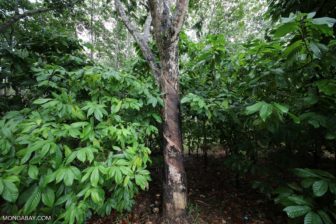
Rubber and coffee grown together in a more sustainable system in China: agroforestry. Image courtesy of Rhett Butler.
Background
Mongabay is increasing its coverage of food systems as both a cause of and potential solution to a wide range of social and environmental ills. That’s why we’re keen to dig into agroecology – the application of ecological principles to agricultural systems – as an approach for creating environmentally sound, sustainable, low-input and low-impact agricultural systems as an alternative to the fossil fuel-intensive industrial model.
Submit your pitch
Mongabay is excited to offer paid opportunities for journalists to report on agroecology around the world. We welcome new story proposals for print, video, data, and multimedia journalism. For a full description and details about how to submit your pitch, please click here.
What is agroecology?
Agroecology embraces a community model that emphasizes cooperation and food production for local or regional consumption rather than a large-scale corporate consolidation model that focuses on cash crops for long-distance export. The latter can lead to land conflict with Indigenous and traditional peoples. Agroecology needn’t be large scale, and can be adapted to urban, suburban, and rural environments; to tropical and temperate zones; and is as applicable in the Amazon as in Paris.
Still not sure if you want to cover this topic? Join our webinar on October 21, 2021 to learn more about agroecology from several experts who will share views, trends, and maybe even story ideas. More info here, and if you can’t join or miss it, a recording of the event will be available there later.
Our interests
We are particularly interested in stories that are relevant to one of the following subjects, themes, or approaches:
- Agroecology best practices research: Scientific studies on best agricultural practices and food systems relevant to agroecology.
- Innovative success stories: Projects, organizations, and/or people using practices that restore or support biodiversity to provide food and income for their communities.
- Overview of successful cooperative practices: Stories can profile a wide range of community involvement in farming, unique organizational food production systems. For example, co-gardening, food banks, cooperatives, ecovillages, etc.
- Public and private policy: Analysis, comparison, and contrast of public and private sector policies including the economic conditions in which alternatives to industrial agriculture face systemic barriers, and also in which agroecology best practices are encouraged.
Pitch a story to Mongabay about agroecology here.